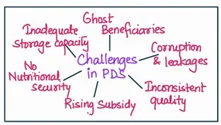Answer:
| Approach:
Introduction
- Give a brief idea about the Public Distribution System (PDS) and its objectives.
Body
- Mention the challenges of PDS.
- Mention how PDS can be made effective and transparent.
Conclusion
- Conclude stating that PDS has been the lifeline of millions but it can do more than just food security by focusing on nutritional security.
|
Introduction:
The Public Distribution System (PDS) is an Indian food security system which evolved as a system for the distribution of food grains and other essential items to low-income households at affordable prices and management of emergency situations. It is the largest food security scheme globally and covers almost 60% of the Indian population.
Enroll now for UPSC Online Course
Body:
Challenges in the PDS:
- Identification of beneficiaries: In the beneficiary statistics, there are significant inclusion and exclusion errors of households that are Below Poverty Line (BPL) and Above Poverty Line (APL).
- Lack of reliable regular data and consistent government estimates of household actual income exacerbate the targeting issue.
- Corruption and leakages: There have been widespread reports of corruption and leakages in the PDS, with middlemen and corrupt officials diverting subsidized goods for sale in the open market or selling them at higher prices to beneficiaries.
- Rising Subsidy and financial burden: The cost of obtaining and shipping food grains is almost six times their retail price, which raises questions about the sustainability of the scheme.

- Increased grain procurement, associated expenses, and other variables are expected to cause the food subsidy to expand
- In this context, Shanta Kumar Committee recommended that FCI hand over all procurement operations of wheat and paddy to states that have gained sufficient experience in this regard and have created reasonable infrastructure for procurement.
- Shortfall in storage capacity with FCI: Although there has been a significant increase in purchasing, FCI’s storage capacity (both owned and hired) has not risen in step with the growth in purchasing.
- Inconsistent quality: The vast majority of responders claimed that the ration quality varies —sometimes it’s great, sometimes it’s terrible. The criticisms mostly related to the poor quality of the wheat and rice.
- No nutritional security: The PDS has traditionally focused on the distribution of a few basic staples such as rice, wheat, and sugar, with little variety in the types of goods available across regions.
Ways to make it effective and transparent:
- Universal PDS: Tamil Nadu implements a universal PDS, such that every household is entitled to subsidised food grains. This way, inclusion and exclusion errors are reduced.
- Decrease subsidy burden on government: In order to increase the effectiveness of PDS, the Economic Survey 2020 suggested limiting the scope of PDS to the bottom 40% of the population and decreasing the subsidy burden on the government.
- Digitalisation: States such as Chhattisgarh and Madhya Pradesh have implemented IT measures to streamline TPDS, through the digitisation of ration cards, the use of GPS tracking of delivery, and the use of SMS based monitoring by citizens. Use of Aadhaar helps prevent duplication and provides for better authentication.
- The Justice Wadhwa Committee Report for PDS (2011) recommended computerization to prevent diversion and to allow for safe identification at ration stores.
- Direct Cash Transfers: The Government is asking States/UTs to choose Direct Benefit Transfer (DBT) in order to check leakage and diversions.
- Improving storage capacities: Shanta Kumar Committee recommended private participation in storage and distribution to make the system effective. In line with this recommendation, storages are built by private investors and contracted by FCI for a guaranteed duration of 10 years under the Private Entrepreneur Guarantee (PEG) Scheme.
- Wider range of products: Diversify procurement basket. Including local grains in PDS would reduce cost and also ensure nutritional security. The Justice Wadhwa Committee had recommended inclusion of fortified grains under the scheme.
- One Nation One Ration Card Scheme: This would help the migrant population access the benefits of PDS and reduce the exclusion errors.
- Local control: Involving civil society organizations and community groups in the implementation and monitoring of the PDS to ensure accountability and transparency. For instance, the Fair Price Shops can be under the management and control of Gram Panchayat.
Conclusion:
PDS is a scheme that has become the lifeline for millions and its role was clearly highlighted during the pandemic. But there is a lot to improve to make the system efficient. PDS must rapidly reinvent itself to successfully alleviate hunger among millions of poor. In particular, it needs to transform its rigid planning processes into responsive and flexible processes that can serve the highly variable demand quickly.
